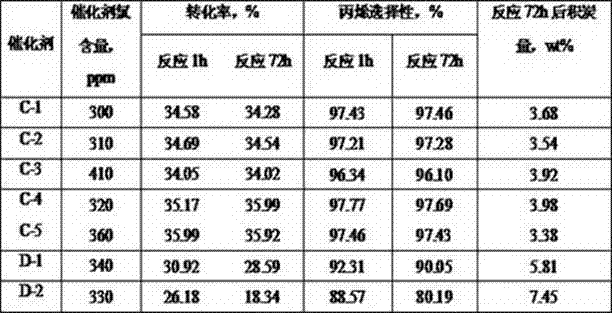Preparation method for low carbon alkane dehydrogenation catalyst
A catalyst and propane dehydrogenation technology, applied in the direction of hydrocarbons, hydrocarbons, chemical instruments and methods, etc., can solve the problems of carrier specific surface area, pore structure destruction, weakening PtSn interaction, Pt particle aggregation and growth, etc. Achieve the effects of simple preparation method, avoid damage, and be beneficial to industrial production
- Summary
- Abstract
- Description
- Claims
- Application Information
AI Technical Summary
Problems solved by technology
Method used
Image
Examples
example 1
[0014] Weigh an alumina carrier (spherical, 1 mm in diameter, 0.73 cm in pore volume) containing a certain amount of Sn 3 / g, specific surface area 232m 2 / g, the carrier used in the following examples) 30g, deionized water was added dropwise to initial moistening, and the volume of consumed water was 27mL. Weigh a certain amount of potassium nitrate and dissolve it in deionized water, set the volume to 27mL, add it to 30g of Sn-containing alumina sample, age for 4h, dry at 80°C for 8h, and roast at 600°C for 4h to obtain Sn and K-containing alumina Carrier samples. Then weigh a certain amount of chloroplatinic acid and dissolve it in deionized water, set the volume to 27mL, add it to the above-mentioned alumina sample containing Sn and K, age for 4h, and place the obtained sample in a tubular heating furnace after there is no clear water. Raise the temperature to 400°C under a nitrogen atmosphere, and feed a mixed gas of methane, nitrogen, and oxygen, wherein the concentrat...
example 2
[0016] Weigh an alumina carrier (spherical, 1 mm in diameter, 0.73 cm in pore volume) containing a certain amount of Sn 3 / g, specific surface area 232m 2 / g, the carrier used in the following examples) 30g, deionized water was added dropwise to initial moistening, and the volume of consumed water was 27mL. Weigh a certain amount of potassium nitrate and dissolve it in deionized water, set the volume to 27mL, add it to 30g of Sn-containing alumina sample, age for 6h, dry at 100°C for 6h, and roast at 600°C for 6h to obtain Sn and K-containing alumina Carrier samples. A certain amount of chloroplatinic acid was then weighed and dissolved in deionized water, and the volume was adjusted to 27 mL, and added to the above-mentioned alumina sample containing Sn and K, and aged for 4 hours. The sample without clear water is placed in a tubular heating furnace, heated to 450°C under a nitrogen atmosphere, and a mixed gas of methane, nitrogen, and oxygen is introduced, wherein the con...
example 3
[0018] Weigh an alumina carrier (spherical, 1 mm in diameter, 0.73 cm in pore volume) containing a certain amount of Sn 3 / g, specific surface area 232m 2 / g, the carrier used in the following examples) 30g, deionized water was added dropwise to initial moistening, and the volume of consumed water was 27mL. Weigh a certain amount of potassium nitrate and dissolve it in deionized water, set the volume to 27mL, add it to 30g of Sn-containing alumina sample, age for 8h, dry at 120°C for 4h, and roast at 400°C for 8h to obtain Sn, K-containing alumina support sample. A certain amount of chloroplatinic acid was then weighed and dissolved in deionized water, and the volume was adjusted to 27 mL, and added to the above-mentioned alumina sample containing Sn and K, and aged for 6 hours. After no clear water, the sample is placed in a tubular heating furnace, heated to 350°C under a nitrogen atmosphere, and a mixed gas of methane, nitrogen, and oxygen is introduced, wherein the concen...
PUM
| Property | Measurement | Unit |
|---|---|---|
| specific surface area | aaaaa | aaaaa |
| diameter | aaaaa | aaaaa |
| specific surface area | aaaaa | aaaaa |
Abstract
Description
Claims
Application Information
 Login to View More
Login to View More - R&D
- Intellectual Property
- Life Sciences
- Materials
- Tech Scout
- Unparalleled Data Quality
- Higher Quality Content
- 60% Fewer Hallucinations
Browse by: Latest US Patents, China's latest patents, Technical Efficacy Thesaurus, Application Domain, Technology Topic, Popular Technical Reports.
© 2025 PatSnap. All rights reserved.Legal|Privacy policy|Modern Slavery Act Transparency Statement|Sitemap|About US| Contact US: help@patsnap.com

